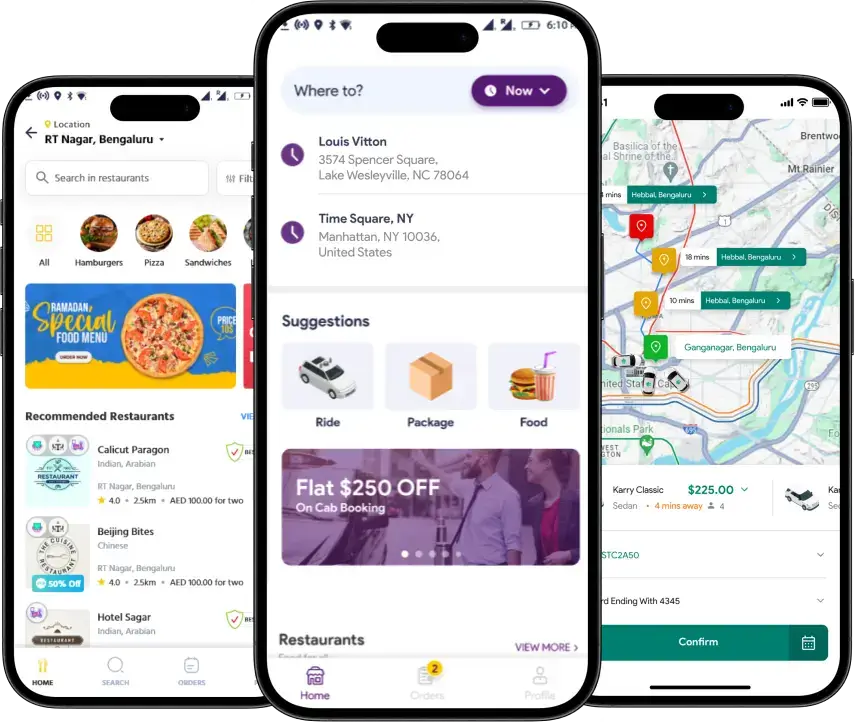 DA 50+ Guest Posts – Get Featured on Real Authority Blogs!
DA 50+ Guest Posts – Get Featured on Real Authority Blogs!
The Role of APIs in SaaS
Written by kefi » Updated on: June 17th, 2025

The Role of APIs in SaaS: Integrations and Extending Functionality
In the ever-expanding landscape of SaaS development, creating an efficient, reliable, and scalable application is paramount for success. The best way to meet these goals while enhancing the user experience is through robust integrations, and that's where APIs (Application Programming Interfaces) come into play. APIs have become the central element for extending the functionality of SaaS products, enabling seamless communication between various systems, and creating richer, more dynamic applications. This blog will explore the crucial role APIs play in SaaS development, how they enable integrations, and how they help in expanding the functionalities of SaaS applications.
What Are APIs, and Why Do They Matter in SaaS Development?
An API is a set of rules and protocols that allows different software applications to communicate with each other. In the context of SaaS development, APIs allow a SaaS platform to connect and share data with other third-party applications, services, or internal tools. APIs act as the bridge that facilitates data exchange and feature sharing across different platforms, making them an integral component of the modern software ecosystem.
In today’s SaaS world, customers demand more flexibility and a more interconnected experience. SaaS products often need to integrate with other software tools, such as CRMs, marketing automation platforms, payment gateways, social media tools, and analytics platforms. APIs allow SaaS companies to meet these expectations by making their applications more versatile, capable of communicating seamlessly with external services.
APIs are also crucial for expanding the scope of what a SaaS application can do. With APIs, developers can add new functionalities to the platform without reinventing the wheel. Instead of building every feature from scratch, they can leverage existing services and tools and integrate them into the SaaS application. This significantly reduces development time and costs.
The Role of APIs in Enabling Seamless Integrations
Integrations are one of the key strengths of using APIs in SaaS. APIs allow developers to connect their SaaS applications with external platforms, enabling smoother user workflows and better cross-platform functionality. Let’s dive into some of the most important roles APIs play in facilitating integrations.
Data Synchronization Across Multiple Platforms
In SaaS environments, data synchronization is crucial for ensuring a consistent and smooth user experience. APIs allow for real-time synchronization of data between various systems, whether it's syncing customer information, payment data, or analytics. This ensures that users can access the most up-to-date information at all times, no matter which platform they are using.
For example, integrating an API that syncs user data from a CRM into your SaaS platform will enable you to automatically populate customer profiles with information gathered from external sources. This integration reduces the need for manual data entry, which can often lead to errors or discrepancies. APIs ensure that data flows seamlessly between systems, maintaining consistency and reliability.
Automating Workflows for Efficiency
APIs enable automation by connecting different services and streamlining workflows. By integrating your SaaS application with third-party tools, you can automate several repetitive tasks, which can save users a lot of time. For instance, when a user signs up for a service through your SaaS product, an API integration could trigger a welcome email, add the user’s contact information to a CRM system, and even assign the user to an appropriate workflow in a project management tool, all without manual intervention.
Automating workflows not only enhances user experience but also increases the efficiency of the entire system. APIs give users more power to configure their own workflows and automate tedious tasks, which helps to increase productivity.
Third-Party Service Integration
APIs are essential for incorporating third-party services and tools into your SaaS application. For instance, you might want to add features such as payment gateways (Stripe, PayPal), email marketing tools (MailChimp, SendGrid), or even artificial intelligence-powered services (Google AI, OpenAI). APIs allow you to integrate these services into your SaaS product quickly and efficiently, expanding its capabilities without the need for complex coding or time-consuming development.
For example, integrating an API for a payment gateway allows your SaaS application to accept payments, process refunds, and manage subscriptions, all without needing to build an entire payment processing system. This kind of integration significantly accelerates the development process and ensures that your users have access to the best tools available.
User Authentication and Identity Management
APIs play a vital role in user authentication and identity management within SaaS applications. By integrating with identity providers like Google, Facebook, or LinkedIn through APIs, users can log in using their existing credentials, which eliminates the need for multiple passwords and simplifies the login process.
Additionally, APIs enable Single Sign-On (SSO) functionality, which is especially useful in enterprise-level SaaS products. With SSO, users can log in to multiple applications with a single set of credentials, making it easier for businesses to manage access and improve security.
This integration not only improves security by using trusted authentication methods but also enhances the user experience by making the login process faster and more convenient.
Extending Functionality with APIs
Beyond enabling integrations, APIs are also an excellent way to extend the functionality of a SaaS application. Instead of constantly reinventing the wheel, developers can leverage existing APIs to enhance their products, adding features that would be costly or time-consuming to develop from scratch. Here’s how APIs extend the functionality of your SaaS application:
Enhanced Reporting and Analytics
APIs can be used to integrate powerful analytics and reporting tools into your SaaS product, allowing you to provide detailed insights and data-driven reports to your users. For example, integrating with Google Analytics through an API can help you track user behavior, monitor key metrics, and generate custom reports that provide actionable insights.
By using APIs to connect to these analytics platforms, you can significantly improve the reporting capabilities of your application and give your users more valuable information to make data-backed decisions.
Improving Communication and Collaboration
APIs can be used to integrate messaging and communication tools into your SaaS product, allowing teams to collaborate more efficiently. For instance, integrating Slack, Microsoft Teams, or Zoom APIs can allow users to communicate in real-time within your platform, boosting collaboration and productivity.
Adding communication features through APIs enhances your product’s functionality by providing users with an integrated experience that eliminates the need to switch between multiple platforms.
Expanding Access to Cloud Services
APIs also allow SaaS applications to access a wide range of cloud services. For example, you could integrate with cloud storage providers like Amazon Web Services (AWS), Google Cloud, or Microsoft Azure to offer users seamless cloud-based storage directly within your SaaS application. This extension of functionality opens up new possibilities for users to store, share, and manage their data efficiently without leaving the platform.
Customizing SaaS Offerings for Clients
Through APIs, you can offer more personalized and customizable experiences for your clients. By allowing your users to integrate their existing tools or business-specific systems into your SaaS platform, you can tailor the application to meet their specific needs. This flexibility not only improves user satisfaction but can also result in higher customer retention.
How to Leverage APIs for Your SaaS Application Development
As APIs continue to play a pivotal role in the SaaS application development process, developers must carefully plan how they will implement and utilize them. APIs must be selected, integrated, and managed in a way that provides value to both the business and the user.
If you're considering how APIs could enhance your SaaS application, now might be the time to assess your existing integrations and explore additional functionality through third-party services. APIs can help expand your product’s capabilities, improve user satisfaction, and drive growth in your SaaS business.
If you're interested in exploring the benefits of SaaS application development services for your business, we encourage you to book an appointment with our team of experts.
Book an Appointment
Conclusion
APIs are undeniably a core element of SaaS development, enabling developers to build more powerful, flexible, and scalable applications. They allow for seamless integrations with external systems, third-party services, and custom functionalities that extend the value of your SaaS platform. APIs streamline workflows, enhance communication, and empower your users to do more with your application. As SaaS businesses continue to evolve, leveraging the power of APIs is essential for staying competitive in the market.
Incorporating robust APIs into your SaaS application development strategy is no longer optional—it’s essential for meeting the growing demands of your users and building a truly next-generation SaaS product.
Note: IndiBlogHub features both user-submitted and editorial content. We do not verify third-party contributions. Read our Disclaimer and Privacy Policyfor details.
Copyright © 2019-2025 IndiBlogHub.com. All rights reserved. Hosted on DigitalOcean for fast, reliable performance.











